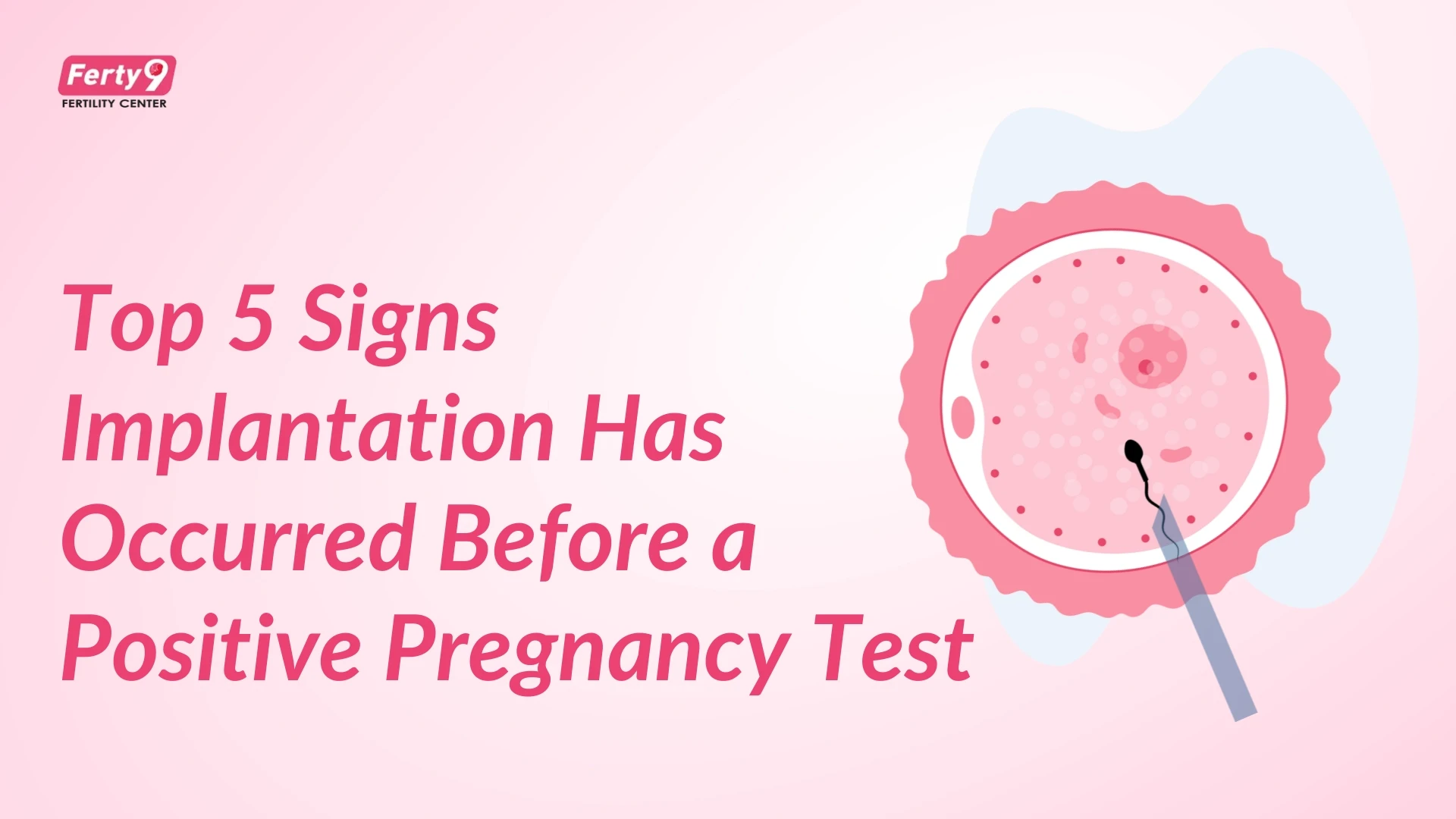For couples eagerly trying to conceive, the wait between ovulation and a missed period can be a time of increased sensitivity, with every twinge and change in the body being closely monitored. This is the time when a fertilized egg may be making its home in the uterine lining – a process called implantation. As a leading fertility centre in India, we at FERTY9 understand your anticipation and the desire to look for early signs of pregnancy.
While a positive pregnancy test is the only definitive confirmation, certain subtle signs might suggest that implantation has successfully occurred. It’s important to remember that every woman’s body is different, and some may experience all these signs, while others may notice none at all.
Also Read: How Soon Can a Pregnancy Test Be Taken After Implantation?
Here are the top 5 signs of implantation that you can look out for, explained in simple terms:
1. Implantation Bleeding or Spotting
One of the most talked-about early signs of pregnancy is implantation bleeding. This is light spotting that can occur when the embryo attaches itself to the wall of your uterus.
- What it looks like: Unlike a regular period, implantation bleeding is typically very light. The colour can range from light pink to a rusty brown. It’s usually not enough to require a sanitary pad.
- When it happens: This usually occurs about 6 to 12 days after you ovulate, which can be close to when you might expect your period.
- Key difference from a period: Menstrual bleeding usually starts light and gets heavier, is a brighter red, and lasts for a few days. Implantation bleeding is scanty and may only last for a day or two.
2. Mild Cramping
Along with implantation bleeding, you might experience some mild cramping in your lower abdomen. These cramps are generally not as intense as your regular menstrual cramps.
- What it feels like: Many women describe it as a light pulling or a tingling sensation. It’s the uterus responding to the embryo embedding itself into the lining.
- When it happens: This can occur around the same time as implantation bleeding, about a week or so after ovulation.
- Keep in mind: These cramps should be mild. If you experience severe pain, it’s always best to consult your doctor.
3. Breast Tenderness and Changes
Hormonal changes begin almost immediately after implantation. One of the first places you might notice these changes is in your breasts.
- What to expect: Your breasts may feel tender, swollen, or heavier than usual. You might also notice that the areolas (the area around your nipples) appear darker.
- Why it happens: The rapid increase in pregnancy hormones, particularly estrogen and progesterone, is responsible for these changes as your body starts preparing for milk production.
- Is it different from pre-menstrual breast soreness? While many women experience breast tenderness before their periods, this sensitivity can feel more pronounced in early pregnancy.
4. Increased Fatigue
Feeling unusually tired all of a sudden? This overwhelming fatigue could be a sign of successful implantation.
- What it feels like: It’s more than just feeling a little sleepy. You might feel exhausted and need to rest more than usual, even if you haven’t been very active.
- The reason behind it: A surge in the hormone progesterone is the primary culprit. Your body is also working hard to support the newly implanted embryo, which requires a significant amount of energy.
- A common Indian context: In our busy lives, it’s easy to dismiss fatigue. But if it’s persistent and out of the ordinary for you, it’s worth paying attention to.
5. Changes in Cervical Mucus
You might notice a change in your vaginal discharge after implantation.
- What to look for: In the early stages of pregnancy, it’s common to have an increase in a thick, creamy white or pale yellow discharge.
- Why does it change? Rising hormone levels increase blood flow to the vaginal area, leading to an increase in cervical mucus. This discharge helps to protect the cervix and keep the vagina clean.
- Important note: This discharge should not have a foul odour or be accompanied by itching or burning, as this could indicate an infection.
A Word of Caution
While these signs are encouraging, they do not guarantee that you are pregnant. Many of these symptoms can also be associated with premenstrual syndrome (PMS) or other hormonal fluctuations. The most reliable way to know if you are pregnant is to take a home pregnancy test after you have missed your period or to consult your doctor for a blood test.
At FERTY9, we are committed to supporting you at every step of your journey to parenthood. If you have any questions or concerns about your fertility, we encourage you to schedule a consultation with our experienced specialists. Remember to be patient with your body during this time and look after your physical and emotional well-being.




























